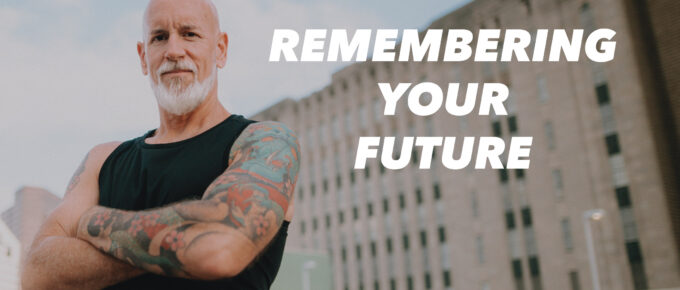When most people set goals for themselves, they think small. They set goals that feel doable, safe, and comfortable, goals that won’t cause them too much suffering if they don't achieve …
232. Achieving Impossible Goals
Podcast Transcript
My name is Patrick McGilvray, and I’m an experienced marathoner, ultra runner, Sports Nutritionist, Master Life Coach, and weight loss coach for runners. I’ve dedicated my life to helping runners just like you properly fuel your body and your mind. So you can get leaner, get stronger, run faster, and run longer than you ever thought possible. This is Running Lean.
Hey there and welcome to episode 232 of Running Lean. My name is Patrick McGilvray, the weight loss coach for runners and today, Achieving Impossible Goals. When most people set goals for themselves, they think small. They set goals that feel doable, that feel safe, that feel comfortable, and goals that won’t cause them too much suffering if they maybe don’t achieve them, but is this really what you want for yourself? I don’t think so. Not me. Definitely not.
I want to set goals that feel kind of scary, uncomfortable, and downright impossible. So in this episode, I’m going to explain why you shouldn’t be setting small, easily achievable goals, but instead working on achieving those big, impossible goals.
But first, if you’ve been thinking about improving your health, your fitness, your running, if you’ve been thinking about losing weight, improving your diet, and you want a ton of guidance and support to help you get there, you might want to consider coaching.
The fact is, coaching works where other methods fail because it’s not about one particular diet or one particular exercise routine. It’s about understanding what works for you as an individual, and then learning how to do that on your own.
One thing I tell all my clients is that you need to not need me at some point. You got to get to this place where you can do this on your own. My job is to help you get to that point. What good is it to make these lifestyle changes if they’re not sustainable for you? They have to be sustainable for you, right?
This stuff has to become easy and effortless for you, so that you can do it on your own, so that you can stick with it. My job is to make sure you stick with it. So if you want to hit the easy button on your weight loss goals, on your running goals, on some big, impossible goal that you have for yourself. Let’s work together to get you there. Just go to my website, runningleancoaching.com click on work with me, and I will show you exactly how to become the most badass version of yourself yet Cool.
All right, let’s talk about achieving impossible goals. So right now we’re about halfway through the year. It is the beginning of June 2024, right now. So if you’re listening to this in the future, that is very cool, because it’s like time traveling. You’re like time traveling. But anyway, so if you are listening to this in real-time, then we’re about halfway through the year.
You may have set some goals for yourself, maybe some running goals. Maybe you ran a spring marathon or spring half marathon, or some spring races or ultra-marathons or whatever. And now it’s time to kind of reassess your goals. And you’ve taken some time off, or kind of in the off-season right now, and so you’re thinking about goals for the fall.
So you might be setting some intentions and some goals for some fall races, or maybe you have other health and fitness goals. Maybe you have a weight loss goal, and now would be a great time to get started on that. And so right now is a good time to be thinking about setting some big goals for yourself.
But here’s the thing, most people, when they set out to set a goal, when they decide on goals that they want for themselves, they they pick a goal that’s either too vague or too small. So they pick goals that are vague, like I want to lose weight, or I want to eat healthier, or I want to get stronger, I want to get stronger, I want to run faster, I want to run more.
These goals are very vague because there’s nothing specific to commit to, right? It’s much harder to commit to goals like I’m going to lose 20 pounds, I’m going to stop eating processed food, I’m going to I want to be able to lift 315 pounds in a deadlift. I want to be able to be able to do that three times. Or run a 23-minute 5k or run four times a week.
When we get specific with our goals, they become it’s a little bit harder, right? Because you now you’re kind of, you have to hold yourself accountable. You’re you’re on the hook for something. But a lot of people won’t do that. They’ll just pick vague goals, like, I need to eat healthier. What does that even mean? They don’t even know what it means.
Like, they’re just like, saying it because they they know that if they don’t achieve it, they don’t really have to fess up to anything. They don’t have to own up to anything. There’s no own ability. There’s no accountability there. So. Vague. We don’t want to set vague goals, and we don’t want to set goals that are too small.
A lot of people set goals that are very small. I want to lose five pounds, or instead of running a 5k I want to run maybe 6k okay, that’s fine if you’re just getting into running. But listen, set some goals that are bigger, because when you set these small goals, you know they’re easily achievable. They don’t require you to get out of your comfort zone at all. They are well within your comfort zone a lot of times.
You’ve probably already done these things. You’ve probably already lost five pounds. A bunch of times to say, like, oh, I want to lose five pounds. That’s something you know you can do. You already know you can do that? You’ve done it before, or you’ve got clothes, or it just seems easy for you.
The problem here is that setting these tiny little goals means that you’re probably going to achieve them, which is fine, but what did you gain in the process? What did you learn? How much did you grow? Who have you become in that process? Small goals. They feel safe, they feel comfortable, they feel doable. These are what people call realistic goals.
Oh, you need to be realistic. I say screw that. We need to set goals that are unrealistic. You need to set some goals that are way outside your comfort zone. And I call these impossible goals because they are impossible for who you are right now, who you are here today. You cannot achieve these big goals you know you, you should always have some, some goals that feel impossible for who you are today, that are not comfortable, safe or realistic.
Who wants to achieve realistic goals honestly? You need to be going after things in your life that feel impossible, because when you do, when you do achieve those goals. They can be life-changing.
Achieving impossible goals means you have you’ve done a lot of work to get yourself to the point where you could become the kind of person to achieve that goal. It means you’ve accomplished something you never thought you could, and then you did that. That’s an amazing feeling, right there. So instead of small, vague goals, we want to set big impossible goals, goals that feel unrealistic, that feel uncomfortable, that don’t feel like they’re in your comfort zone, that don’t feel safe, that don’t feel doable, they should feel impossible.
And really this is the biggest benefit of setting and going after these big, impossible goals is who you become in the process. You know, think about a small goal like losing five pounds. You can do this with pretty little effort. It’s not going to take much time. You’ll probably gain it back pretty quickly too, because you didn’t set a goal like, oh, I need to, I’m going to lose 30 pounds, and then I’m going to keep it off, right?
But, okay, let’s just say you want to lose the five pounds. That’s great. Okay, fine. Who did you become in the process? What’s changed for you? What did you learn? What’d you learn about yourself? What’d you learn about sustainability? How have you grown? My guess is not much of any of that stuff. You probably didn’t learn much. Probably didn’t grow much. You’re basically the same person.
Okay, well, let’s use the example of losing 30 pounds and keeping it off. Now that might feel more like an impossible goal for you right now. So let’s say it takes you a year to lose the weight. It takes you a year to lose 30 pounds, and then you’ve maintained that weight loss for another year. So so far, we’ve talked about where you’ve invested two years of time into this goal already. Okay, that’s a lot of time.
What did you learn about what did you learn along the way? Maybe you had to learn how to plan meals around family vacations and social events and holidays and work trips. You had to learn how you could have some cheat meals here and there without going completely off the rails. That takes some time to figure that out.
You learned how to change your mindset around food, so you no longer have those cravings for sugar all the time. And then when you do occasionally have the cravings, you know how to deal with them. You don’t let them derail you like you can just move on, right? You’ve learned which foods work for you and which ones don’t.
You learned how to maintain your weight loss over time, which is actually the hardest part of all this. So you’ve grown. You’ve learned all these things, and you’ve grown in the last two years.
You no longer have the mental and emotional hangups around food. You feel like you’re back in control of your eating for once in your life, you’re no longer operating on autopilot. You’re no longer eating mindlessly. Basically, you’ve become a different person, the person you were two years ago when you started on this journey could not have done any of this stuff.
This was impossible for who you were two years ago, but that’s not who you are here today. You’ve become a completely different person. So. This is one of the most important outcomes of achieving an impossible goal. It’s who you become in the process, who you are here today. You can’t achieve that goal, that goal is way outside your comfort zone.
Maybe your impossible goal is running your fastest marathon this fall, and it’s impossible because the person you are here today cannot run. Let’s say it’s a sub-four. You want to run sub-four marathon, and you’ve never been able to do that, so that’s not who you are today. You cannot run a sub-four, four-hour marathon today.
So this is an impossible goal for you, but in order to achieve that goal, you have to get to work. You have to stick to a pretty rigid training schedule for months. You have to do all the speed work. You have to keep improving your tempo runs like improving the times, improving the distance, and improving the amount of time that you’re running fast.
You have to be able to sustain that, and it’s going to require that you stick to a strict eating plan to support your running goals, because you don’t want to gain a bunch of weight during this training season, right? If you’re trying to PR, you’re trying to run your fastest marathon ever.
So this is this all feels impossible for who you are today, but listen, you do the work. You show up for yourself, day after day, week after week, month after month. Come the fall, when you’re towing the line at the start of that marathon, you’re the kind of person who could run a sub-four marathon, because you’ve done the work, you’ve completely become a different person, but between today and who you are six months from now.
So this is one of those things where we think that a goal feels impossible to us, and it does feel impossible to us, but we think it’s impossible for us to achieve that goal. And in reality, there is a possibility that we can do we can pretty much do anything we want, right? But you got to set your mind to it. You have to commit to the process. You have to commit to becoming the kind of person that can do that.
And then listen, when you show up at the start line of that race, you’ve become a different person. You’ve learned, you’ve grown. You’ve become so much more than you ever thought you could become. It really doesn’t even matter if you hit the goal or not. So let’s say you run a 4:01. Is that a failure? Did you fail? I say no, because look who you are. Now, you’ve become this completely different person. You’ve learned, you’ve grown, you’ve become more it’s not about achieving the goal necessarily. It’s about who you become in the process.
Now, of course you want to achieve the goal, and of course you’re going to do the work to basically make sure that that outcome is inevitable, but the real underlying purpose of all of this is to learn about yourself, to grow and to become more and if you do that, I say that you have absolutely succeeded.
And then also keep in mind that every success requires a lot of failures to get there, right? Every success was built upon a big old pile of failures. I think Henry Ford said that, so don’t be afraid to try fail, try fail, try fail, until you succeed. The number one rule with all this stuff is you never, ever, ever give up.
You keep going until you achieve that goal, impossible or not, because if you never quit, you will eventually achieve that goal. If you’re committed to achieving that goal, you will get there eventually. So that impossible goal can become possible for you.
Now, I’ve done a few impossible things in my life. Some years ago, I completed a full Ironman. You know, I’ve run 50 miles, 100 miles. Last year I did a 12-hour solo run, unsupported, no headphones, no talking to anybody. Very much a solo in my own head event.
But for things like running 100 miles, you know, when I signed up for that, I could not run 100 miles. I was not the kind of person that could run 100 miles. I couldn’t imagine doing that. This was impossible. This felt impossible for me. And here I was paying the money on their website and signing up, and, you know, saying that I was gonna, like, sign up for this thing. And I’m like, “Who do you think you are, Patrick, signing up for 100 miler? This is ridiculous. You’re ridiculous. I don’t see how you’re gonna do this.” because I didn’t know at the time.
I was like, I know that somehow between now and, you know, a year from now, or however long it was, I think it was maybe 10 months, 11 months, something like that, that I signed up in advance. I knew that I was going to become the kind of person that could run 100 miles by the time I started that race.
And for me, showing up at the start line, knowing I did all the work, was the big accomplishment, and then doing it, obviously it was amazing, you know? But every time I set out to do something big like this, it feels impossible for me at the beginning of the process.
Yeah, and I know that in order to get there, I got to do the work and I have to level up. I got to learn and grow and become more and I know that by the time I show up at the event, I’m a different person, and I’ve already succeeded. In my mind, I’m it’s already a success.
And then when you do achieve something like that, when you do the hard work, and you set out to do something that is impossible, and you actually achieve it. You finish the race, you lose the weight, you’re able to keep it whatever that goal is for you, it becomes so much sweeter because it was so hard.
Listen, I am not a crier. I am not somebody who cries. Have a very hard time, like crying even. So, okay, I will say this about movies, I will cry. I do cry at movies, but every time I’ve completed something impossible, like, you know, finishing my Ironman, running my 100 miler, 50 miler, even half Iron Man like I’ve cried at the end of these things, because it’s such an emotional event.
It was, it was a life changing event. And so when you set out to do something that feels impossible and you actually do it, there’s no other feeling in life quite like that. So I want to encourage you to think about this. Think about something big, something that feels impossible for you today, something that you want to achieve, and pick one thing that really stands out, that gets you out of your comfort zone.
I want you go to go after that one thing. Don’t pick 10 different impossible goals, because it’s just too overwhelming. You need constraint. You have to practice constraint of focus. Focus on one goal at a time. Go all in on that one goal. When you finish that one goal, then you can move on to something else, right? And it kind of depends on the goal.
But for me, I like to have one impossible goal on my plate every year, or maybe one every other year. It depends on how big the goal is, how much time it takes. Blah, blah, blah, okay, but have something in mind. Pick something, and then I want you to go after that. I want you to go all in on yourself, see what you’re capable of. Don’t think small. Think big. Don’t think realistic. Think unrealistic. Don’t think doable, think impossible, and then get busy doing the work to become the kind of person who can achieve the impossible. That’s all I got for you today. Love you all. Keep on Running Lean, and I will talk to you soon.





